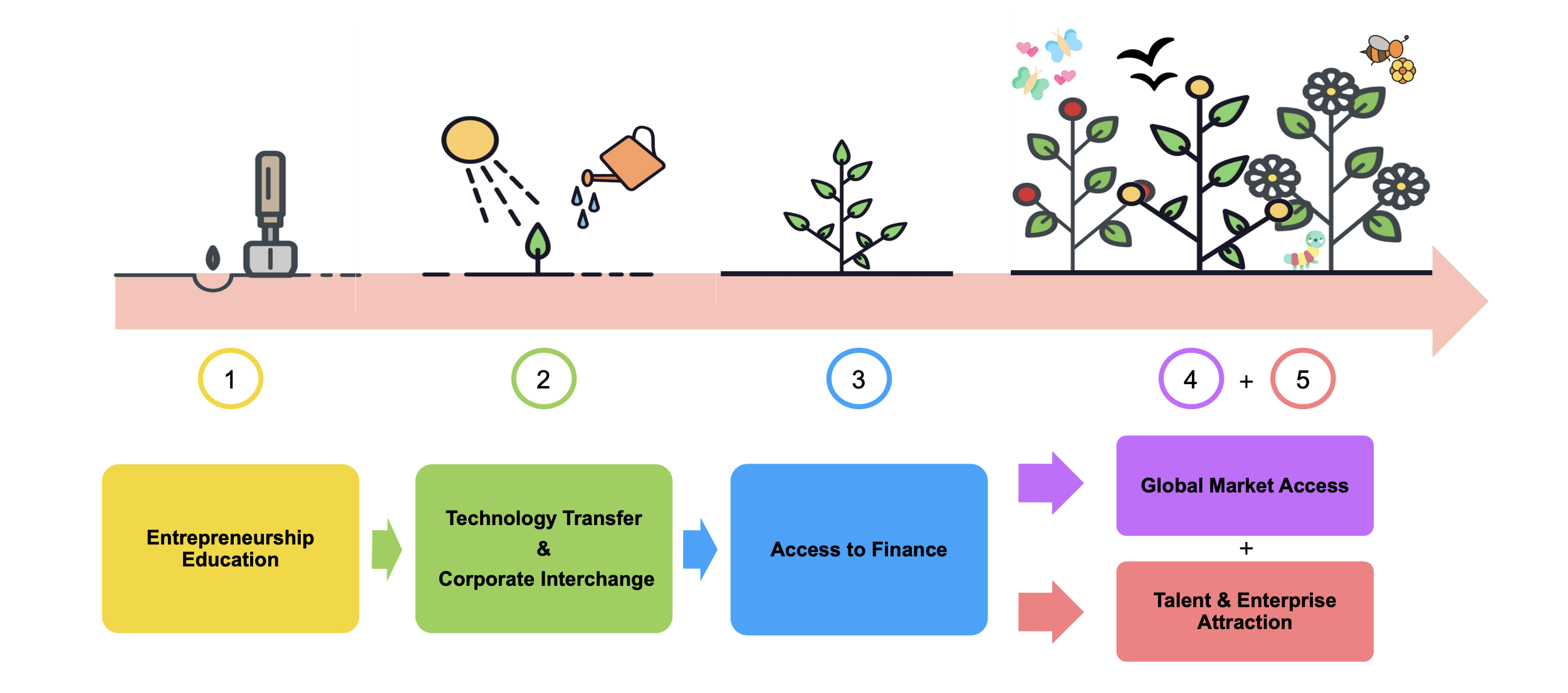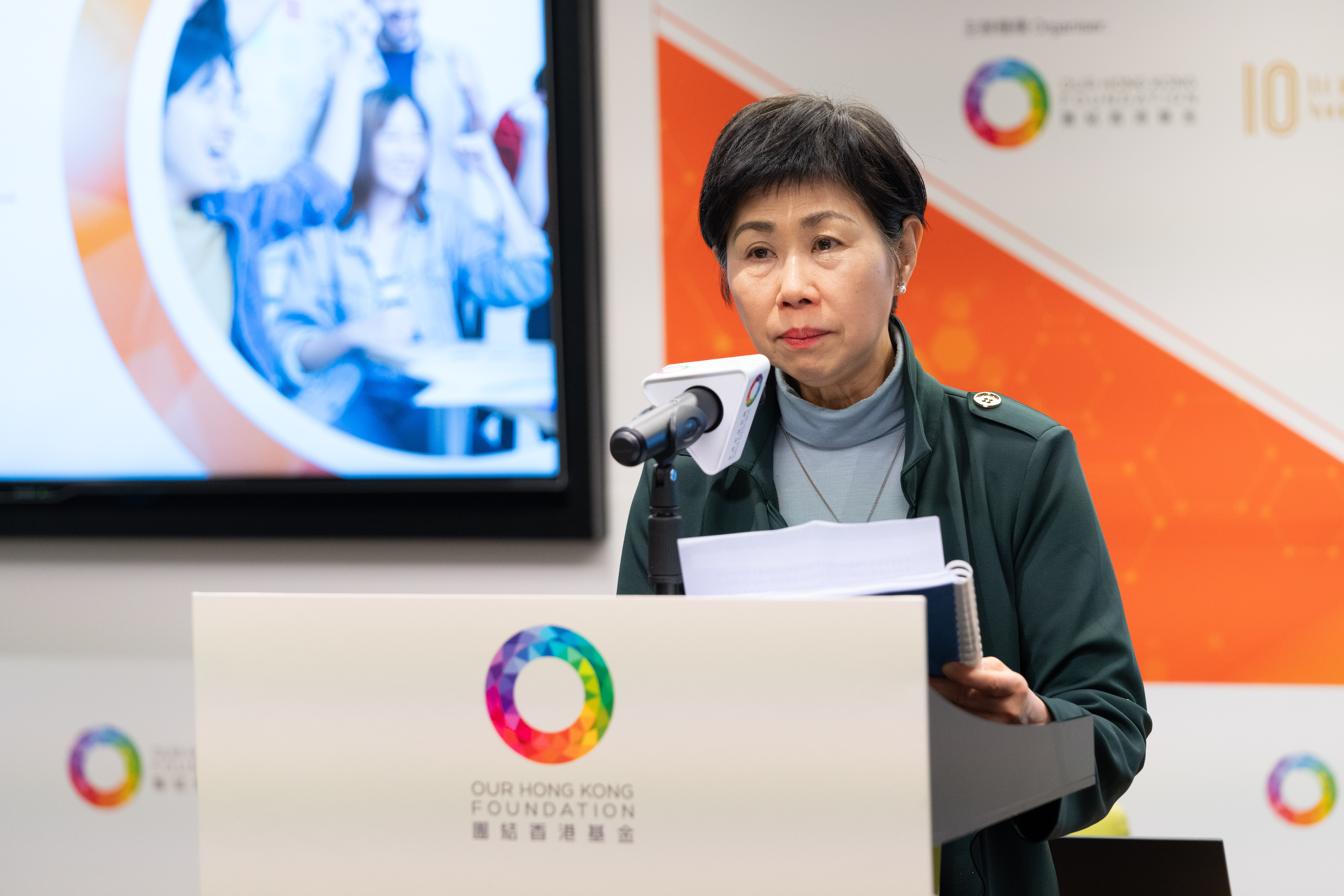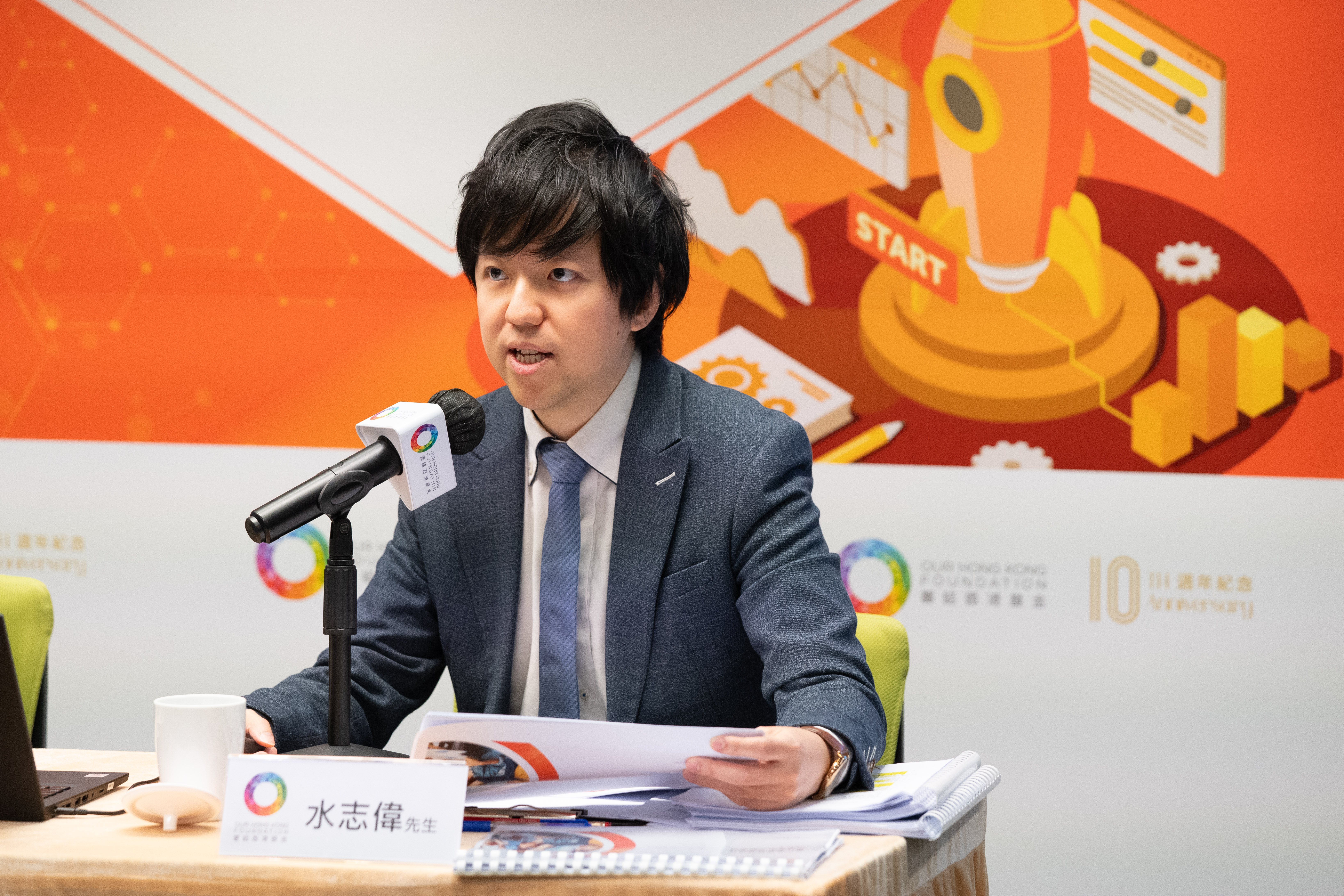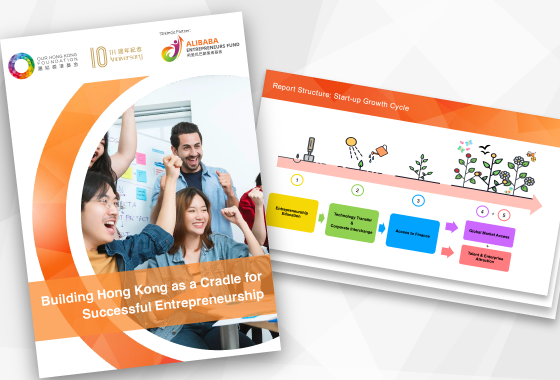Our Hong Kong Foundation in Strategic Partnership with Alibaba Entrepreneurs Fund Launches Policy Research Report to Build Hong Kong as a Cradle for Successful Entrepreneurship
Our Hong Kong Foundation in Strategic Partnership with Alibaba Entrepreneurs Fund
Launches Policy Research Report to
Build Hong Kong as a Cradle for Successful Entrepreneurship
(21March 2024, Hong Kong) Our Hong Kong Foundation (OHKF), in strategic partnership with Alibaba Entrepreneurs Fund (AEF), today released a policy research report titled Building Hong Kong as a Cradle for Successful Entrepreneurship.
Start-ups play a strategic role in driving Hong Kong's economic growth and fostering innovation. Data from the World Bank reveals that a 10% increase in the number of new business start-ups results in a 2.4% growth in GDP per capita and a 2.9% rise in patent filings in the subsequent year. However, despite the Government devoting substantial resources to innovation and technology (I&T) development, investing over HKD150 billion from 2018 to 2022 to nurture startups and bolster the I&T sector, Hong Kong currently ranks 12th in the Global Startup Ecosystem Index 2023, trailing cities like Beijing, Shanghai, and Bangalore. In particular, Hong Kong has relatively less local unicorns (18) behind Beijing’s 91, Shanghai’s 71, and Shenzhen’s 32; and we only account for 0.5% of the global venture capital investments in early-stage start-ups.
This study draws insights from interviews and focus groups, involving more than 70 stakeholders. The report revealed critical gaps that hinder the growth of Hong Kong start-ups from inception to maturity, including:
- Graduates show less interest in starting their own businesses compared to international peers, due to a lack of exposure hence fewer viable business ideas, and a risk-averse tendency;
- Lack of technology transfer staffing, over-reliance on public sector incubation (with nearly 85% of start-ups incubated in public incubators), and low procurement ratio from both the private and public sectors hinder commercialisation of start-up products;
- Lack of risk appetite for early-stage ventures (especially for public sector funding), stringent Hong Kong Stock Exchange (HKEX) listing rules, and cumbersome government funding application procedures limit funding access and exit opportunities; and
- Regulatory barriers and differences in institutional systems when start-ups seek to expand into Greater Bay Area (GBA) Mainland cities and ASEAN markets.
To build Hong Kong as a cradle to successful entrepreneurs, the report proposes 14 policy recommendations across 5 key areas including cultivating entrepreneurial talent, supporting technology transfer and corporate interchange, improving access to finance, aiding in global market expansion, and drawing in global talent and enterprises.

Recommendation 1. Promoting Entrepreneurship Education to Cultivate Entrepreneurial Talent. Learning from Denmark and Finland where EE is systematically integrated into the early-stage school curricula, Hong Kong’s EE should be embedded at all educational levels. Key recommendations include:
- Embedding "Entrepreneurship" into the science curriculum at primary school to encourage problem-solving and innovation through project-based learning, where students apply scientific concepts to develop creative solutions;
- Increasing secondary students' EE engagement by collaborating with entrepreneurship programme providers within the Business-School Partnership Programme, offering interactive business simulation and co-designed training programmes; and
- Developing cross-border, joint entrepreneurship programmes between Hong Kong universities and GBA institutions. This would involve studies at home institutions combined with 1-2 years of immersive training at partner institutes, culminating in final year projects immersed in real-world entrepreneurial settings, with access to industry resources and entrepreneur networks.
Recommendation 2. Facilitating Technology Transfer and Corporate Interchange to Help Start-Ups Grow. To translate research into successful start-ups, universities' technology transfer offices, incubators, accelerators, and other institutions must work together. Recommended policy measures include:
- Developing a diversified incubator ecosystem by incentivising world-class private incubators to set up in Hong Kong. Establishing an incubator hub in the San Tin Technopole will enable local start-ups to access global networks and create synergies between local and global incubators;
- Helping start-ups expand businesses and find the path to achieve financial independence through facilitating start-up participation in public procurement processes, by breaking down larger contracts into smaller, more manageable pieces, and increasing the public and private sectors’ adoption of start-up products and services by expanding the scope of the Smart Government Innovation Lab (Smart LAB);
- Subsidising the recruitment and training of local and international technology transfer professionals to address the understaffing of TTOs, research institutions, local tech companies, etc., thereby strengthening Hong Kong’s capacity to commercialise research; and
- Forming a Technology Transfer Alliance linking TTOs with leading research institutes and industry partners to create a centralised platform that optimises resource allocation and enhances research commercialisation.
Recommendation 3. Boosting Entrepreneurs’ Access to Finance. Investors are often concerned about the high-risk nature of seed and early-stage ventures; particularly, government investments tend to favour late-stage companies. To enhance the flow of capital towards start-ups, this report suggests:
- Establishing an angel fund of funds (FOF) similar to the Yozma Fund in Israel and the Shenzhen Angel Investment Guiding Fund, potentially under the Hong Kong Investment Corporation Limited (HKIC). It would offer crucial seed-stage and early-stage venture capital to local start-ups through sub-funds jointly funded with private VC firms, with a stated priority in high-potential technology sectors such as life & health tech, AI & data science, advanced manufacturing & new energy technology industries;
- Altering listing rules to facilitate capital market access. The lack of companies listed under Chapter 18C of the Main Board Listing Rules of the HKEX points to barriers such as an overly-high market cap requirement. Referencing the Shanghai Stock Exchange (SSE) STAR Market, it is recommended to revise Chapter 18C to lower the market cap threshold and add criteria more suited to start-ups, in order to facilitate listings of Specialist Technology Companies (STCs) in Hong Kong; and
- Accelerating disbursement of government funding schemes for start-ups. The Government can consider allocating a reasonable percentage of the approved funding as upfront payment for projects up to two years and backed by at least one guarantor.
Recommendation 4. Supporting Start-Up Expansion to GBA Mainland Cities and ASEAN Countries. For start-ups to achieve significant growth, market expansion to GBA Mainland cities and ASEAN countries is crucial. To overcome regulatory barriers and support start-ups’ market expansion, the Government can consider:
- Engaging with Mainland authorities to gradually relax entry restrictions for Hong Kong businesses in Mainland China, allowing companies to leverage the vast market potential;
- Expanding incubation services of the Hong Kong Science and Technology Parks Corporation and Cyberport to locations in the GBA and the ASEAN;
- Enhancing policy and trade information support through Hong Kong Economic and Trade Offices in the ASEAN region; and
- Setting up a one-stop GoASEAN platform similar to the GoGBA platform under the HKTDC to offer comprehensive resources and insights on ASEAN market entry.
Recommendation 5. Attracting Global and Regional Talents and Enterprises to Supplement the Start-up Ecosystem. Talent and strategic expertise will enhance the start-up ecosystem and increase Hong Kong's attractiveness as a premier hub for entrepreneurial success. The Government can consider expanding the services of Hong Kong Talent Engage and introducing further tax incentives, so as to boost Hong Kong’s appeal.
Start-ups have significant potential for driving Hong Kong's future growth. However, several policy gaps have been identified through this report. By implementing the recommended measures, including enhanced educational initiatives, streamlined technology transfer, improved access to finance, expanded market opportunities, and the attraction of global talent and enterprises, Hong Kong can catalyze a vibrant entrepreneurial landscape and unlock its potential for innovation and economic growth.
OHKF President Dr Jane Lee said: “Hong Kong's entrepreneurial spirit and our free market economy have constituted our success for decades. As evident in our findings, such spirits of entrepreneurship have declined substantially due to changes in our social environment and mindset of the individuals. Hong Kong needs targeted policies to reignite an innovative entrepreneurial ecosystem - it is the key to elevate our prospects for economic diversification and growth.”
AEF Executive Director and Chief Executive Officer Ms Cindy Chow stated: “In fostering a mature incubation ecosystem, the synergy between private and public incubators is paramount. While public incubators provide valuable resources and infrastructure, private accelerators bring market acumen and venture capital support. Embracing this balanced mix, exemplified by the establishment of a private incubator cluster in San Tin Technopole, ensures startups benefit from a diverse range of support mechanisms. This collaboration propels Hong Kong towards a more robust and internationally competitive startup landscape.”
OHKF Vice President & Co-Head of Research Mr Kenny Shui remarked: “By expanding financing channels and market entry support for start-ups, Hong Kong is prepared to emerge as a leading hub for business innovation and growth, empowering promising local enterprises to ascend to the global arena.”
OHKF Assistant Research Director Mr Victor Kwok commented: “Our vision is to transform Hong Kong into a cradle of entrepreneurial success by unlocking the potential within our future generation. By promoting comprehensive entrepreneurship education and fostering technology transfer, we are laying the groundwork for a future of innovation, growth, and societal well-being.”
Full Contents of Building Hong Kong as a Cradle for Successful Entrepreneurship:
Full Report: https://bit.ly/4cDL2JN
Full Executive Summary: https://bit.ly/4anMPAm








